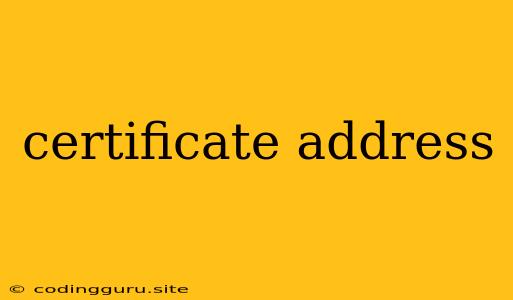What is a Certificate Address and Why Does it Matter?
In the realm of digital security and online transactions, certificate address plays a crucial role. But what exactly is it, and why should you care? Let's delve into the intricacies of certificate address and its significance.
Understanding the Concept of Certificate Address
A certificate address, also known as a "certificate subject alternative name" (SAN), is essentially a specific identifier linked to a digital certificate. It's like a unique address that allows websites, servers, or other online entities to be identified and authenticated. This address can be a domain name, an IP address, or even an email address.
Why is Certificate Address Important?
Certificate address is critical for several reasons:
- Secure Communication: When you browse a website, your browser checks the certificate address to ensure that you're connecting to the intended server. This helps prevent man-in-the-middle attacks and ensures secure data transmission.
- Trust and Validation: A certificate address acts as a seal of approval, indicating that the website or entity holding the certificate has been verified and deemed trustworthy.
- Multiple Identities: A single certificate can be assigned multiple certificate addresses. This is useful for websites with multiple domains, subdomains, or different IP addresses.
What are the Different Types of Certificate Addresses?
Certificate addresses can take various forms:
- Domain Names: The most common type, used to identify websites. For example, "example.com" or "www.example.com".
- IP Addresses: A numerical address that identifies a specific device or network interface.
- Email Addresses: Used for secure email communication and authentication.
- Other Unique Identifiers: Can include server names, device IDs, or other specific identifiers.
How to Check the Certificate Address?
You can check the certificate address of a website by:
- Inspecting the Website Security Information: Most browsers display a padlock icon indicating a secure connection. Clicking on the padlock will reveal the website's security certificate information, including the certificate address.
- Using a Certificate Checker Tool: Several online tools are available to analyze a website's certificate and display its certificate address.
Managing Certificate Addresses: Best Practices
- Keep your Certificate Addresses up-to-date: Ensure that the certificate address information in your certificate matches your actual domain names, IP addresses, or other identifiers.
- Use a SAN certificate if needed: If your website uses multiple domains, subdomains, or other identifiers, a SAN certificate allows you to combine multiple certificate addresses into a single certificate.
- Secure Your Certificate: Protect your certificate and its associated certificate addresses from unauthorized access or modification.
Certificate Address Errors: Common Issues
- Incorrect or Mismatched Certificate Addresses: If the certificate address doesn't match the website's domain name, IP address, or other identifier, you might encounter a security warning or a website loading error.
- Expired or Invalid Certificate: An expired certificate means the certificate address is no longer valid, and you might experience similar issues as with incorrect addresses.
Conclusion
A certificate address is an essential component of digital security, ensuring trust and secure communication online. Understanding the concept, its various forms, and its role in website security is crucial for businesses and individuals alike. By maintaining accurate certificate addresses and implementing best practices, you can protect your website, your users, and your sensitive data.
